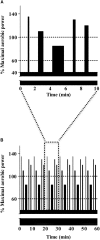Sprinting After Having Sprinted: Prior High-Intensity Stochastic Cycling Impairs the Winning Strike for Gold
- PMID: 30837886
- PMCID: PMC6383108
- DOI: 10.3389/fphys.2019.00100
Sprinting After Having Sprinted: Prior High-Intensity Stochastic Cycling Impairs the Winning Strike for Gold
Abstract
Bunch riding in closed circuit cycling courses and some track cycling events are often typified by highly variable power output and a maximal sprint to the finish. How criterium style race demands affect final sprint performance however, is unclear. We studied the effects of 1 h variable power cycling on a subsequent maximal 30 s sprint in the laboratory. Nine well-trained male cyclists/triathletes (O2peak 4.9 ± 0.4 L⋅min-1; mean ± SD) performed two 1 h cycling trials in a randomized order with either a constant (CON) or variable (VAR) power output matched for mean power output. The VAR protocol comprised intervals of varying intensities (40-135% of maximal aerobic power) and durations (10 to 90 s). A 30 s maximal sprint was performed before and immediately after each 1 h cycling trial. When compared with CON, there was a greater reduction in peak (-5.1 ± 6.1%; mean ± 90% confidence limits) and mean (-5.9 ± 5.2%) power output during the 30 s sprint after the 1 h VAR cycle. Variable power cycling, commonly encountered during criterium and triathlon races can impair an optimal final sprint, potentially compromising race performance. Athletes, coaches, and staff should evaluate training (to improve repeat sprint-ability) and race-day strategies (minimize power variability) to optimize the final sprint.
Keywords: peak power; race profile; repeated sprints; stochastic cycling; triathlon.
Figures


References
LinkOut - more resources
Full Text Sources

